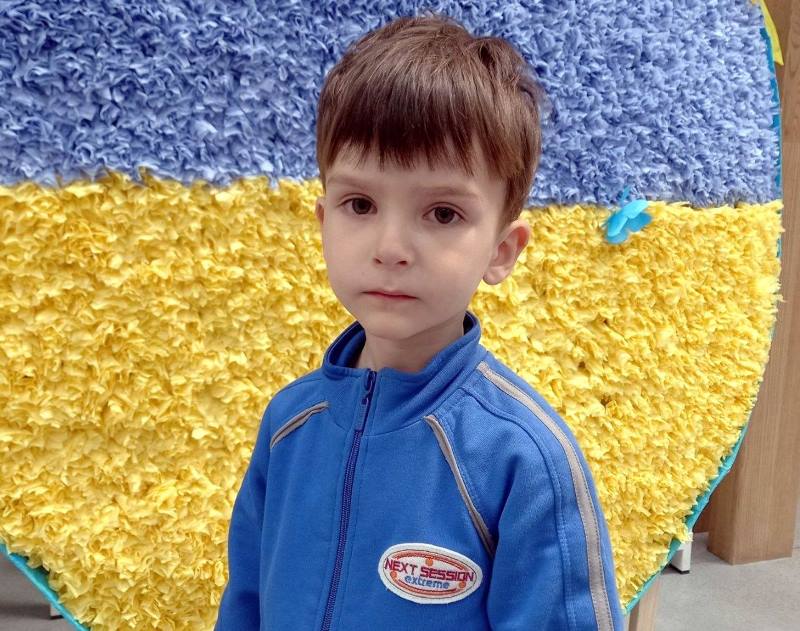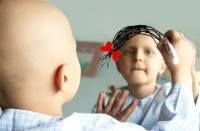Every year some 900 Ukrainian mothers abandon their children in maternity hospitals. Why?
This little boy has a serious illness. He doesn’t know his parents and probably doesn’t understand who is to blame for his conspicuous helplessness. The photographer told us that the little boy lives in a children’s home in Vorzel, a scenic suburb of Kyiv. He is surrounded by people he doesn’t know, who are taking care of more than 50 children, doing their best to make them feel comfortable. Most of these children are bedridden, afflicted with grave nervous system malfunctions. They are brought to Kyiv from maternity hospitals after being formally abandoned by their mothers, or as foundlings. The children’s home will take care of them until they are 14. After that, unless they are adopted, the orphans will be placed by doctors in another institution.
Every year as many as 900 women abandon their children in maternity hospitals in Ukraine. Physicians say they are mostly single mothers between 19 and 25 years old, who already have children and can’t afford more. Psychologists say it is difficult to talk women who have to abandon their babies into keeping their children. As a rule, these women are deprived of parental love and care. Never having learned this in childhood, they cannot share it with others. However, emotional coldness and an unwillingness to burden oneself with childcare does not always result in child abandonment. In the past several years an increase has been noted in the number of so-called social orphans — children who have living parents. Within this group are children who were abandoned by their parents at birth. Statistics indicate that there are some 15,000 children in this category. Many of their mothers are denied support by their families. Their relatives insist that they have abortions or abandon their babies in maternity hospitals. There is no alternative but to set up special centers to house these women with their babies. Local authorities in Kherson opened this kind of center two years ago. Owing to its efforts, 150 children have not lost their mothers, thus avoiding the bitter lot of an orphan. By the end of the year another center will start functioning in Chernihiv. “It will serve as a temporary home for newborns and their parents,” says Tetiana Khymchenko, deputy director of the Mission of the benevolent association “For Every Child,” who told The Day, “Underage moms and dads will be offered an opportunity to complete their education and master the required professional skills. This center will teach home economics and proper childcare.
In the past five years the number of children institutionalized in Ukraine has increased by 40 percent (children up to seven years), and by 65 percent (7-17), even though over 90 percent of minors in institutions have living parents or legal guardians. The Ukrainian government regards raising children in institutions as an extreme measure, when there is no other way to secure their family upbringing.
Today, the Ministry of Family, Youth, and Sports Affairs of Ukraine is summing up findings stemming from inspections of boarding schools in seven Ukrainian oblasts (Kherson, Zaporizhia, Dnipropetrovsk, Zakarpattia, Lviv, Vinnytsia, and Rivne). These inspections were put into motion after children living in these boarding schools wrote letters to the president of Ukraine, complaining that they were being brutalized by the teaching staff and requesting his assistance in resolving a number of pressing problems at such institutions. The ministry told The Day that the crux of the matter is that the system in Ukraine, which is designed to ensure the social protection of young orphans, is ineffective.
The problem is not only keeping such institutions supplied with various types of equipment (although in many cases this is also a big problem), but properly declaring a child an orphan, which will enable that child to return to his native region and/or apartment after his term of residence in the boarding home ends. Depriving orphans of their homes is a very widespread phenomenon. Local authorities often neglect to provide children who became orphans in their jurisdiction with certificates of birth or their parents’ death as well as documents about the termination of parental rights so that their homes cannot be sold. They do not ensure that orphans are paid an allowance for the loss of their parents or maintenance fees on time. Some boarding schools find lawyers ready to defend these orphans in court. Thanks to them, some of them succeeded in obtaining their housing rights.
Scientific studies show that institutionalized children develop various developmental and behavioral problems. They are aggressive, emotionally unbalanced, and egocentric. They have poor self-awareness, they cannot plan their actions and be responsible for them; they have difficulties making decisions. They long for their parents and relatives and often run away from their boarding schools back to their native parts.
Today Ukraine has clearly set a course on the development of family-like care for children deprived of parental care. The priority is to create foster/group homes and families. This system of work, borrowed from the experience of foreign countries, is developing somewhat differently in Ukraine. In the West foster families, as a rule, are designed to house a child temporarily. The child is their work. In Ukraine, however, the concept of foster family is similar to adoption, the only difference being the lack of continuous material support from the state and the social supervision of the foster family. In 2004 Ukrainians adopted fewer than 2,000 orphans and not a single one from abroad. Meanwhile, Britons adopted 3,500 children from inside the country and 2,500 from outside.
There are nearly 100,000 orphans in Ukraine. The chances of finding their parents are slim. Launching a nationwide adoption project requires the enactment of a package of documents. Last month an international conference aimed at convincing countries to sign the Hague Convention on the Protection of Children and Co-operation in Respect of Intercountry Adoptions took place in the Netherlands. Ukraine has repeatedly said it is prepared to sign this agreement, but the frequent changes of government have slowed down this process, as every new cabinet has had to reaffirm its intentions in keeping with established procedures. Ukraine received its first invitation to attend this kind of conference. The Ukrainian delegation submitted a draft national program entitled “A Family for Every Child,” a complex project aimed at formulating national adoption practices. Yevhenia Chernyshova, director of the Adoption Center, told The Day — “The conference participants were especially interested to learn that this issue is being dealt with in a complex manner, that we are placing special emphasis on a training system for foster families; that we regard a foster family as potentially capable of adopting a child.” Chernyshova said that there are sponsors and that partnership arrangements have been made with an organization specializing in adoptions of children in the United States, after a school for future adoptive parents opened in Ukraine. If Ukraine signs the Hague convention, Ukrainian children adopted by foreigners will be legally protected by the government of their country of residence. Under Ukrainian legislation foreigners have the right to adopt Ukrainian children, provided no Ukrainian nationals have expressed a desire to adopt the child within a year of orphanhood. Ukrainians tend to adopt orphans who are healthy, while foreigners are not scared off by bad diagnoses. They believe that sick children also require care. Adopting children with physical and mental handicaps might be less problematic for Ukrainians. But they must be certain that they will have enough energy and funds to meet the special needs of such children. As it is, today Ukrainians can only count on their own resources; it is difficult to believe that the state would lend a helping hand in hard times.



